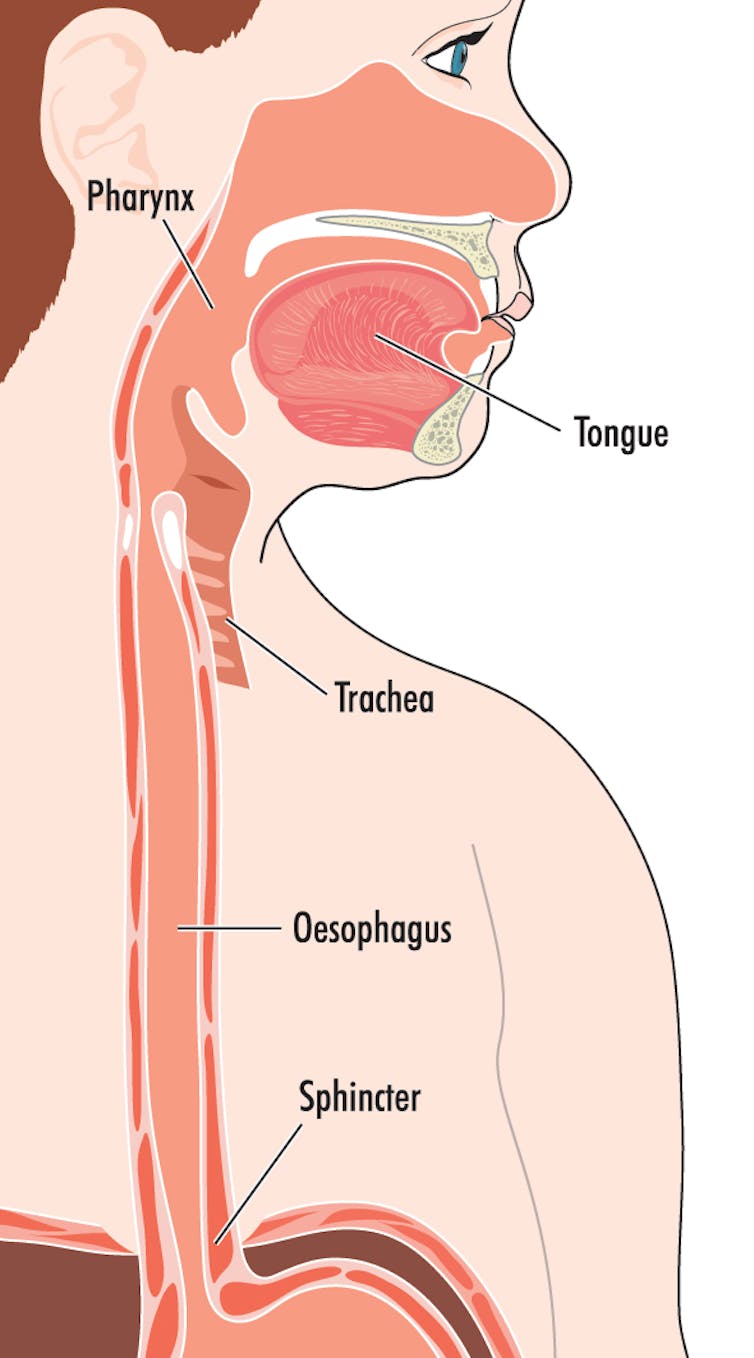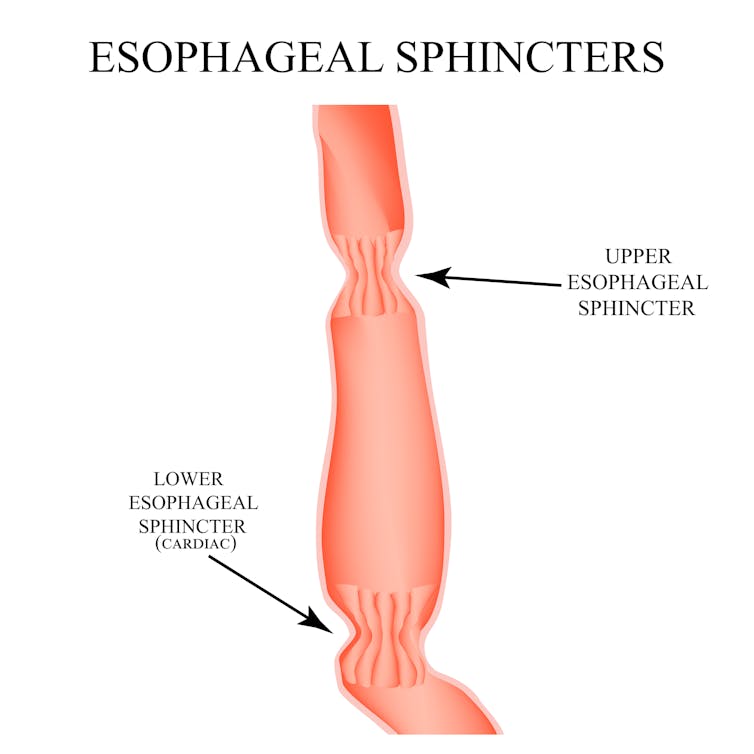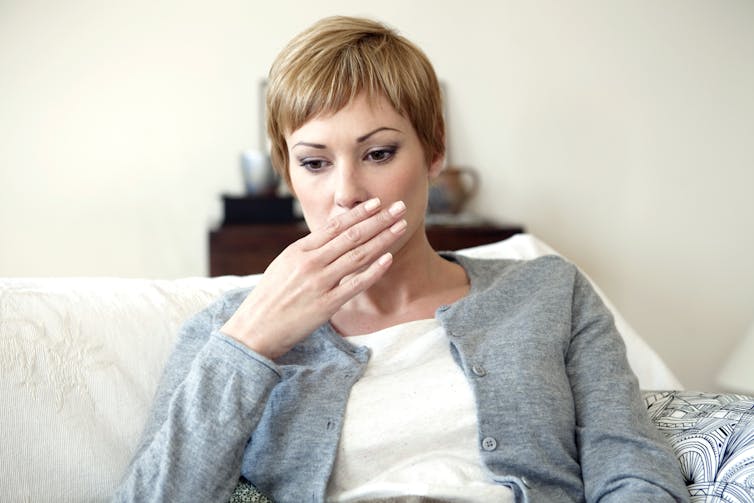Curious Kids: why do we burp?
- Written by Vincent Ho, Senior Lecturer and clinical academic gastroenterologist, Western Sydney University
Why do we burp? We sometimes also burp before meals, why does this happen? — Ahaana, age 7
That is a really interesting question, Ahaana!
There are two types of burping, but mainly we burp to get rid of swallowed air from our stomach.
 Burping occurs when excess air travels up the oesophagus and is released out of the mouth.
Shutterstock
Burping occurs when excess air travels up the oesophagus and is released out of the mouth.
Shutterstock
What is a burp?
A burp is the sudden escape of gas from the food pipe to the top of your throat. It can be loud or silent.
Read more: Curious Kids: why are burps so loud?
The food pipe is a cylinder which sits on top of the stomach, and is known scientifically as the oesophagus.
At either end of the oesophagus is a valve, called a “sphincter”. These valves are quite strong and stop food coming out again after you eat. This is why you can stand upside down after eating without food falling back into your mouth!
When these valves relax, they let out excess gas which we call a burp.
 The two valves, or sphincters, are strong muscles that prevent food from coming back up into your mouth. When we burp, they relax to let the gas out.
Shutterstock
The two valves, or sphincters, are strong muscles that prevent food from coming back up into your mouth. When we burp, they relax to let the gas out.
Shutterstock
Burps get rid of swallowed air
There are two types of burping. The first is known as gastric burping, which comes from your stomach. It is the most common type of burp.
Gastric burping is a normal way our body gets rid of swallowed air. We may not realise it, but every time we swallow food, around a tablespoon worth of air also enters our stomach.
Eventually, this buildup of air stretches the stomach and causes both the valves to relax at both the top and bottom of your food pipe.
For the air that escapes upwards from your stomach, your muscles help to push the air out. These muscles are in a part of your body called your “diaphragm”, and also the muscles at the front of your tummy, which you might call your “abs” or “six-pack”.
These muscles push the air up your oesophagus and then out of your mouth (or sometimes your nose!).
 Burping is normal, and can increase after certain food and drinks, like fizzy drinks.
Shutterstock
Burping is normal, and can increase after certain food and drinks, like fizzy drinks.
Shutterstock
Gastric burping is normal – you can do up to 30 burps a day. We don’t just swallow air while eating, but all through the day. This explains why people can burp before meals as well as after.
This type of burping becomes more frequent when we drink fizzy drinks like lemonade because these drinks have bubbles in them, made of a gas called carbon dioxide. This adds to the air in our stomach and makes more burps.
Burping can also increase when we run around a lot. This is because body movement and increased pressure in the abdomen makes the lower valve relax more frequently.
Gastric burping is usually not a problem for people, except for the rare situations where some people can swallow lots of air. This is called “aerophagia” and can make people feel bloated and do lots and lots of burps.
A good night’s sleep can help reduce burping, and eating different foods that have less sugar and starch in them can also help.
Read more: If sugar is so bad for us, why is the sugar in fruit OK?
Oops, I did it again – and again
Burping is usually fine, but it can turn into a problem if people are burping way too much. This doesn’t usually happen with stomach burps, but it can happen with a second type of burps, which come from above the stomach, in the food pipe. Some people who do these types of burps can burp hundreds of times a day!
Normally, when we try and take a deep breath, the breathing muscle contracts. But in people who do way too many burps, their breathing muscle contracts not on-purpose!
 Burping is normal. But if we burp hundreds of times a day, it could be a sign of a problem.
Shutterstock
Burping is normal. But if we burp hundreds of times a day, it could be a sign of a problem.
Shutterstock
This means that air gets sucked into the food pipe by accident. But air does not go all the way into the stomach. The lower valve remains closed and the “abs” strain, causing the air to be quickly pushed back up the food pipe and out of the mouth.
This type of burping might happen for people who are very stressed or sad for a long time, which we call mental illness.
But thankfully, there are ways to help. One way teaches people who burp too much to use their minds to understand the warning signs. Then they can use special exercises that focus on the proper use of the breathing muscle which can help reduce the burps.
Read more: Curious Kids: why do some people worry more than others?
Hello, curious kids! Have you got a question you’d like an expert to answer? Ask an adult to send your question to curiouskids@theconversation.edu.au
This article is supported by the Judith Neilson Institute for Journalism and Ideas.
Authors: Vincent Ho, Senior Lecturer and clinical academic gastroenterologist, Western Sydney University
Read more https://theconversation.com/curious-kids-why-do-we-burp-137493






